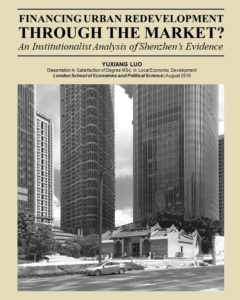
Financing Urban Redevelopment through the Market? – An Institutionalist Analysis of Shenzhen’s Evidence is my Master’s dissertation at the London School of Economics, submitted in August 2016. It won the George and Hilda Ormsby Prize for Best Dissertation in the LSE Department of Geography and Environment. It was also a winning entry of the 7th annual “Reducing Urban Poverty” paper competition co-sponsored by the Wilson Center, USAID, the World Bank, Cities Alliance, and IHC – Global Coalition for Inclusive Housing and Sustainable Cities. I am very grateful to my advisor Professor Andrés Rodríguez-Pose for his guidance and to the MSc Programme Director Dr. Neil Lee for his support. I came to study economic geography with an unusual background; without their help and trust, I would not have even imagined navigating through the most intellectually stimulating year of my education.
The research investigated how indigenous cultural dynamics and local politics can motivate the real estate firm to participate in urban redevelopment, a special type of development project traditionally delivered by the government due to its public welfare implications and prohibitive land assembly costs. Below you can access the full text of my dissertation:

I began my research with a simple inquiry: Why is market-based urban redevelopment only concentrated in certain parts of China? I noticed this pattern while I worked at China Development Bank, which is the national policy bank responsible for financing and promoting urban redevelopment throughout the country. Historically, urban redevelopment, which usually entails the provision of social housing and the upgrading of city infrastructure at high cost of land assembly, has been at the hands of the public sector. Recently, due to China’s tightening local fiscal situations, the government increasingly welcomed private developers to join the venture and share financial risks. Nonetheless, when I started on my research, only a limited number of cities in China had seen active market responses.
Traditional economic theories attribute the uneven distribution of privately funded urban redevelopment to different real estate markets in different parts of China. My personal experience at the policy bank led me to suspect that the true answer might be more complicated. Tearing down the old town and constructing new estates are not just typical real estate transactions; the process of remaking urban neighborhoods in China is an intricate dance between the government, the developer, and the civil society, each with its own motivations, behaviors, and powers.
So, I adopted an institutional lens to study the process of urban redevelopment, asking how local policies and governance structures play their unique roles in the private sector’s involvement. I paid attention to both hard institutions, such as laws and regulations, and soft institutions, such as indigenous cultures, group relationships, and social norms. Using the qualitative research methods, I was able to interview a wide range of stakeholders and uncover nuanced legal and social dynamics that affected real estate firms’ perception of project risks.
After submitting the dissertation, I was told that my dissertation was founded upon my personal friendship and network, and that is very true. Many friends offered their generous help during the fieldwork and write-up phases. Special thanks go to Josh Yang, Qianqian Zhang, Mei Yang, Yi Yu, Shr-Jie Jian, my mentor at China Development Bank – Jie Sun, and those who shared their experiences and opinions during the interviews.
The dissertation at LSE later inspired my thesis at Harvard University, for which I further explored the same case but with additional focus on spatial implications and the urban planning discourse.